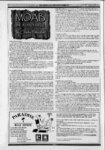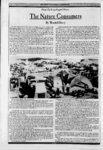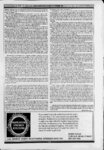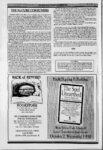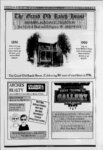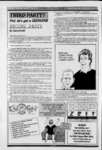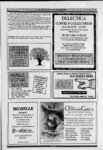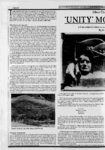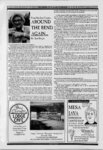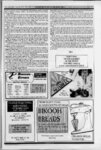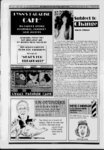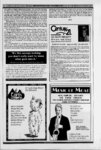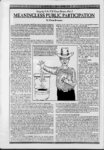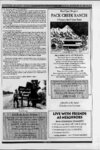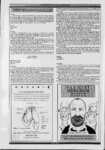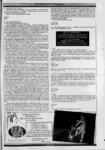| OCR Text |
From The Long-Legge- d House- -. The Nature Consumers By Wendell Berry We were awakened shortly after sunrise one Sunday morning by a woman's voice imitating a top sergeant over a public address system The amplifier was turned up to such volume that the sound seemed to come from all directions. The air was lull of it It could have been heard a mile away. Such a noise blasting into our sleep might have been alarming if it had not been so easy to guess the source: On the night before two cabin cruisers had tied up a hundred yards or so downriver from our house, and this was their method of waking up. That morning it had to be our method too. The P.A. system continued at full volume for maybe two hours: first the woman's strident sergeant imitation, waking up her fellow boatmen, and then radio music Finally I went down to where the boats were tied and asked that the speaker be turned down, and was told by one of the boatmen: "We didn't know anybody lived around here." There is no need to repeat all that was said, but the boatman made one other remark that surprised me. When I insisted that he had no right to create such a disturbance, he said: "We're on the river, you know." I came home shortly after dark one night to see the light of a campfire on die shore of the river below the house, and when I stopped my car I could hear rock 'n' roll coming up from a radio. Several men, their boats moored at the shorn, were sitting around the fire, drinking and talking, their conversation enclosed in music there as it would have been in a bar. I told them they were welcome, and asked only that they cany off thuir bottles and other garbage. One of the men replied: "Why, we're boatmen." His tone implied that my request was so unnecessary as to be insulting-tha- t boatmen were not only respectful of the river but, a group, especvdhf respectful of it The next morning when I went back the boats were gone, and the rocks were strewn with bottles and with plastic and paper trash. The place had hardly been used, much less respected-i- t had been perched upon, befouled. Ignored. Having spent the night them, those men doubtlessly did not recognize it on their way back. I remember from two or three years ago a young couple who came to spend a vacation camping beside the river. Their car and camping trailer stopped on the road, and the young man got out Even then he was wearing a pistol He asked about a camping place, and I told him where to find one. He made his camp on the riverbank, not far from the place where I came to work every day. He rented a rowboat from the man on wtose place he camped, and the next morning went out on the river to fish. He was using the old-tileisurely equipment: pole and line, float, sinker, and hook. But he never stayed still long enough to fish. He rowed first to one float bobbing frantically in his place and then another and then another, the wake. He could stay in any place no more than a few minutes, and when he moved he rowed with all hia might. Now and then he rowed down to his camping place and called to his wife, who apparently would not leave the trailer. At almost regular intervals he drew his pistol and fired at, I don't know. For two more days he went on in that way, rowing the boat from one place to another in the same aimless haste. He never did really fish. His wife never rode with him in the boat And at the same nervous intervals I continued to hear the report of his pistol On the fourth morning he rented from the same man an old speedboat, and spent the whole day trying to make the motor run. He would pull die starter rope, and make an adjustment, and pull the rope again. The motor would start and run a few hundred feet-twhet his appetite-an- d die. The sun burned down on the river, and the day wasted, and ha pulled die rope and tinkered with the engine and pulled the rope. The next day they were gone. lte it-w- o He had made dear die sent of vacation he wanted: a simple, quiet, restful time in a natural place. But he had proved as immune to that, as alien to the possibility, as if he had never thought of it He had stayed as remote from the place he had came to as if he had time had come, and passed: three days never left the city where he lived. The longed-fo- r He has become a symbol, to me, frustration. terrible of terrible restlessness, and a day of of an alienation from the world that I believe to be common among us, and on the increase Because he could not be still, the place could not exist for him. If his restlessness could have found expression in horsepowerif he had had a motorboat that would many miles would he have traveled in those few days? How many places would he have marked with his oblivious passage? Our house stands on a slope overlooking five Kentucky River a few miles from its entrance into the Ohio at Carrollton. It has been a long time since this was a "natural river." A system of navigation locks and dams was built in the last century, and die land of the bottoms has been as intensively fanned as any in Kentucky. Yet, for those who know where and how to look, the valley still has a rich natural life. In the summers we see wood ducks and muskrats raising their young along the banks. The great blue heron fishes here. In die woods on the bluffs and around the slews there are still enough trees for plicated woodpeckers to make a living. At night we often hear the awesome family talk of barred owls, or the balking of a fox. Occasionally we see deer. And beavers have begun to appear again on the banks of the river and its bigger tributaries where they were run-ho- w exterminated long before anybody now living can remember. Here and there cm the wooded slopes of the valley are tall open groves of a solemn beauty that keep, as if in a profound Interior withheld from the ceaseless drone of engines, a fragment of the great quietness that two centuries ago lay upon the whole valley. The delicate flowers and mosses and ferns and colorful mushrooms of the woods grow there. The voice of those places is that of the wood thrush, whose notes, without replacing the quiet, flow into it from some hidden perch-an- d into die hearing of whoever may be there, to attach Itself like a clarifying emblem on the memory. In rainy times the streams step noisily and brilliantly down die rocky notches. If one can respond to the quirt of those places with quiet, and with enough attention, the woods will reveal its fives: squirrels and chipmunks leading the eyes into unsuspected places among the treetops and among roots and rocks and fallen logs on the ground; vlreos and warblers dnat 8 the dense foliage; water thrushes searching the edges of rocky pools. Knowing this valley, once one has started to know it, is dearly no casual matter. Like all country places, it is both complex and reticent It cannot be understood by n"Ml"g through. It does not, like Old Faithful gush up its inwards on schedule so as not todelay the hunying traveler. Its wonders are commonplace and shy. Knowing them is an endless labor and, if one can willingly expend the labor, an endless pleasure. I am not sure how one would fedge a valley or compare It to any other. I guess that this one must be as attractive as most To me, because I have been its Inhabitant and Intimate, it is the most attractive of all I know that among all the other lives it holds and promises there is the possibility of rich hours and days and lives for peojde. I have known this valley all my life. Rom the first it has been a source of pleasure to nftraction. Every day I am here I learn more lnterc?land the more I learn the more it, dearly I see that my knowledge of it is one of its fragments. The one part of Its history that I have known from the beginning is die pleasure-boa- t era. Since die end of World War H motorboats have lncrearedfrom rarity to such prevalence that on summer holidays and week-end- s the traffic is comparable to that on a ElCHTi nJ'obJe? 3 |



